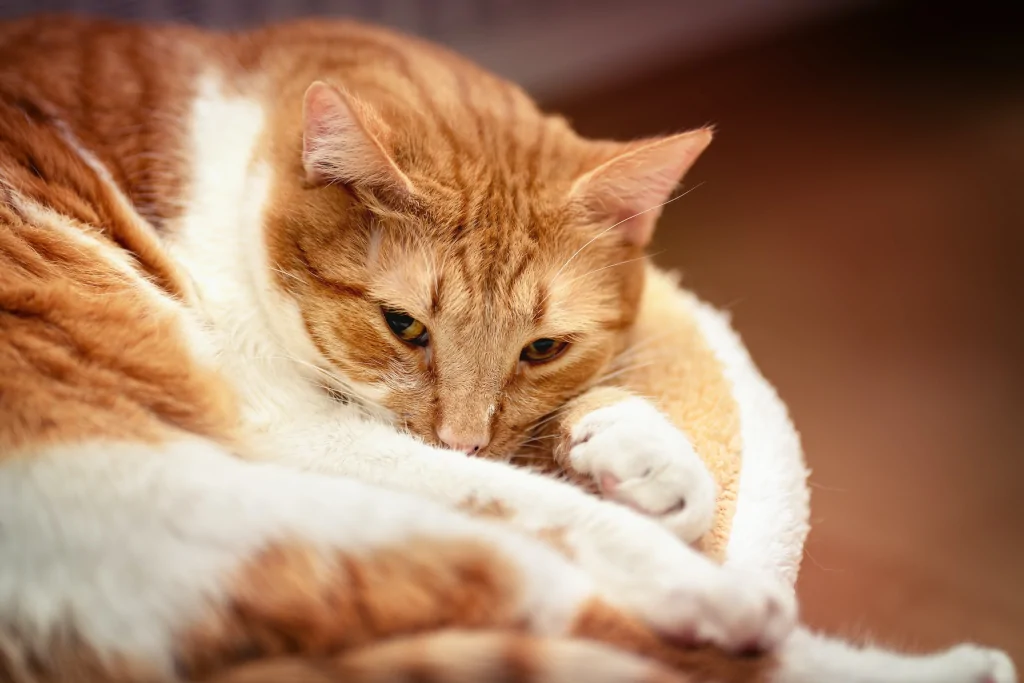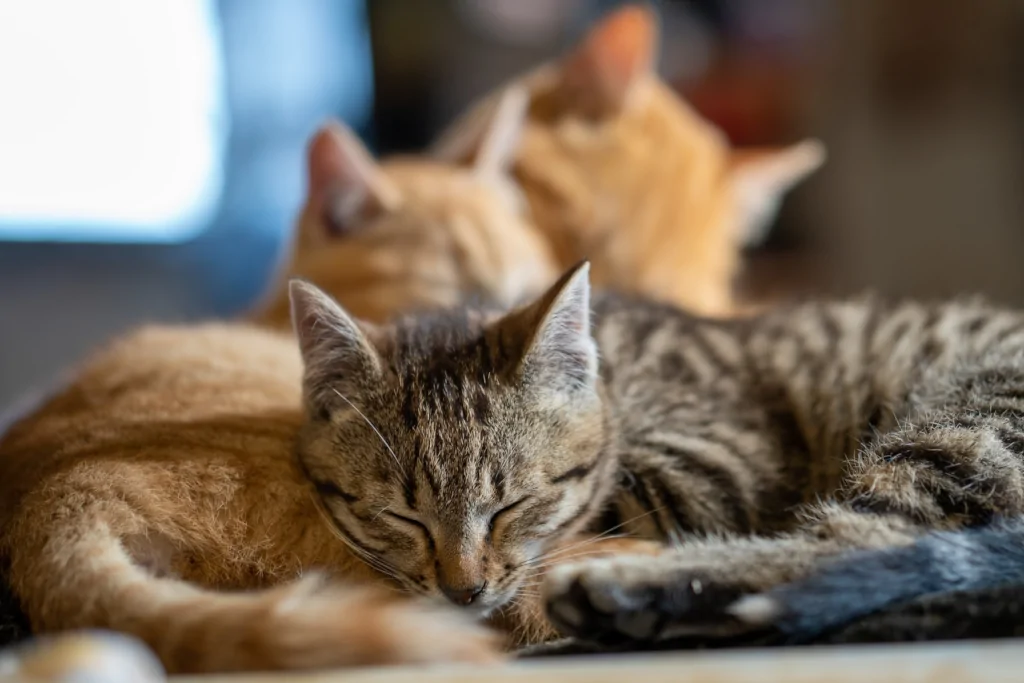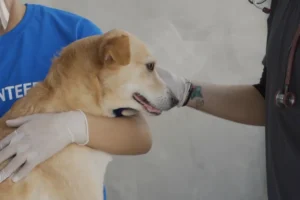Disclosure: We may earn a commission from helpful, relevant links in our content. No cost to you. See our privacy policy.
Picture the relief you feel when your feline friend purrs contentedly on your lap, a stark contrast to the concern that creeps in when you learn about the potential dangers lurking in their world, such as heartworms.
As a fellow cat parent, I understand that sinking feeling when you realize that your precious kitty could be at risk of a heartworm infection.
Just the thought of it makes you want to wrap them in a protective bubble, doesn’t it? But worry not because we have compiled a comprehensive guide to understanding, treating, and preventing heartworms in cats, empowering you to keep your furry companion safe and sound.
So let’s dive into the world of feline heartworms together and ensure your cat stays purring for years to come.

What Are Heartworms and How Do Cats Become Infected?
Heartworms are parasitic worms called Dirofilaria immitis, which can infect both dogs and cats.
While these parasites are more commonly associated with dogs, cats are not immune to their threat.
The infection starts when a cat is bitten by a mosquito carrying heartworm larvae. The larvae enter the cat’s bloodstream, eventually maturing into adult worms that reside in the heart and lungs.
In cats, the number of worms is typically low, but even a single worm can cause significant health issues.
What Are Potential Health Risks of Heartworm Infection in Cats?
Heartworm infection in cats, known as feline heartworm-associated respiratory disease (HARD), can lead to a range of health problems.
The presence of adult heartworms can cause inflammation and damage to the blood vessels in the lungs, resulting in respiratory issues, coughing, and difficulty breathing.
In severe cases, heartworm infection can lead to congestive heart failure or even sudden death. Early detection and prevention are crucial, as the risks posed by heartworms are not something to be taken lightly.
How Can You Recognize the Signs of Heartworms in Your Cat?
Recognizing the signs of heartworm infection in your cat is essential for early intervention and minimizing potential health risks. Symptoms can vary and may be subtle, but here are some common signs to watch out for:
- Coughing. A persistent cough or wheezing could be an indication of heartworms causing respiratory issues, similar to what lungworms can cause.
- Lethargy. If your cat is less active than usual, tires easily, or is reluctant to play, it could be a sign of heartworm infection affecting their overall health.
- Weight loss. Cats with heartworms may lose weight or have a reduced appetite due to the infection’s impact on their body.
- Rapid or labored breathing. Difficulty breathing or increased respiratory rate might indicate the presence of heartworms in the lungs.
- Collapse or fainting. In severe cases, heartworm infection can lead to sudden collapse or fainting due to poor blood circulation or heart failure.
Let me share a personal story. A friend of mine noticed her cat, Whiskers, was more lethargic than usual and had started coughing occasionally. Concerned, she took Whiskers to the vet, who discovered that the poor kitty had heartworms.
Thankfully, because she paid attention to the subtle changes in her cat’s behavior, they were able to begin treatment early, and Whiskers is now on the road to recovery.
Remember, early detection is key to managing heartworm infection. If you notice any of these symptoms in your cat, consult your veterinarian promptly for a proper diagnosis and treatment plan.

How to Treat Your Cat for Heartworms?
When it comes to treating heartworms in cats, it’s crucial to understand the challenges involved and the importance of veterinary care. Here, we’ll break down the treatment process and offer some practical tips for cat owners.
The Challenges of Treatment
Treating heartworms in cats can be a complex process, as there is no approved drug for the direct treatment of feline heartworm infection. The primary focus is on managing symptoms and supporting your cat’s overall health. Some of the challenges include:
- Limited treatment options. Unlike dogs, there is no approved “kill and clear” medication for cats, so treatment focuses on supportive care and waiting for the worms to die naturally.
- Potential complications. Treating the symptoms of heartworm infection may involve medications to reduce inflammation or prevent blood clots, but these can sometimes cause side effects or complications.
Importance of Veterinary Care
Proper veterinary care is essential for managing heartworm infection in your cat. Here’s what your veterinarian may recommend:
- Regular check-ups. Frequent visits to the vet are crucial to monitor your cat’s condition and adjust treatment as needed.
- Medications. Your vet may prescribe medications to manage symptoms, such as corticosteroids for inflammation or bronchodilators to help with breathing.
- Heartworm preventatives. Even if your cat is already infected, your vet will likely recommend a heartworm preventative to avoid future infections and reduce the worm burden.
- Monitoring. Diagnostic tests like chest X-rays or ultrasounds may be necessary to evaluate your cat’s heart and lung health over time.
A real-life example that comes to mind is Bella, a sweet cat who was diagnosed with heartworms. Her owner worked closely with their veterinarian to create a personalized treatment plan involving regular check-ups, medications to manage inflammation, and heartworm preventatives. Over time, Bella’s condition improved, and she now lives a happy and healthy life.
In conclusion, the key to treating heartworms in cats is to work closely with your veterinarian to create a customized treatment plan that addresses your cat’s unique needs. Regardless of the types of worms, these parasites can be nasty.
Be patient, provide loving support, and follow your vet’s recommendations to give your cuddly critter the best chance at recovery.
How Can You Prevent Heartworm Infection in Your Cat?
Preventing heartworm infection in your cat is not only easier than treating it, but it also ensures your feline friend stays healthy and happy. Here are a few practical steps you can take to protect your cat from heartworms:
Monthly Heartworm Preventatives
Administering a monthly heartworm preventative prescribed by your vet is the most effective way to protect your cat.
Options include topical applications, oral medications, and even injectables. Choose the best option for your cat based on your vet’s advice and your cat’s preferences.
Yearly Heartworm Testing
Regular testing helps detect heartworm infection early, increasing the chances of successful management. It also ensures that the preventative is working effectively.
Minimize Mosquito Exposure
Since heartworms are transmitted through mosquito bites, reducing your cat’s exposure to mosquitoes can lower the risk of infection.
Keep your cat indoors during peak mosquito hours, install screens on windows, and use mosquito repellents approved for cats.
Maintain a Healthy Lifestyle
A strong immune system can help your cat fight off infections. Provide a balanced diet, regular exercise, and routine veterinary care to keep your cat in tip-top shape.
Consider the story of Tom, a cat owner who learned about heartworm prevention the hard way. After his first cat was diagnosed with heartworms, he took every precaution to protect his new cat, Lilo.
He started Lilo on a monthly preventative, ensured she had annual heartworm tests, and took measures to minimize her exposure to mosquitoes. As a result, Lilo has remained heartworm-free, and Tom has peace of mind knowing he’s doing everything he can to protect her.
By following these practical recommendations and working closely with your veterinarian, you can greatly reduce the risk of heartworm infection in your cat.
Prevention is always better than cure, and taking these steps will ensure your feline companion stays healthy and heartworm-free. Check out some of our other health guides for cat owners.
FAQS
Can indoor cats get heartworms?
Indoor cats can contract heartworms, as mosquitoes carrying heartworm larvae can find their way indoors and transmit the parasite through bites.
How is heartworm prevention different for cats and dogs?
Heartworm prevention differs between cats and dogs, with cats typically requiring monthly preventatives and dogs having additional options, like longer-lasting injectables. Ensure to always use species-specific preventatives to avoid harm.
How often should my cat be tested for heartworms?
It’s recommended to have your cat tested for heartworms annually, allowing for early detection and assessment of the effectiveness of preventative measures.
Are heartworm preventatives safe for all cats?
While most heartworm preventatives are safe for cats, consult your veterinarian before administering any medication, as they will consider factors such as your cat’s age, weight, and health conditions.
Alex, a passionate animal lover, has experience in training and understanding animal behavior. As a proud pet parent to two dogs and three cats, he founded AnimalReport.net to share insights from animal experts and expand his knowledge of the animal kingdom.




